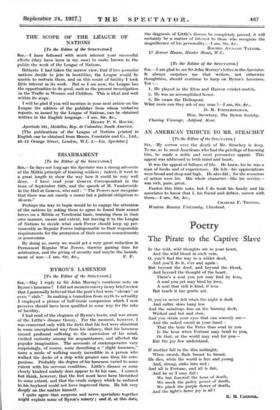BYRON'S LAMENESS
[To the Editor of the SPECTATOR.] SIR,—May I reply to Sir John Murray's courteous note on Byron's lameness ? I did not meanto convey in my brief review that.I personally believed that the poet's feet were " cloven" or even-" club." In making .a transition from myth to actuality
I employed a phrase of half-ironic compassion which I now perceive should have been qualified in some way for the sake of lucidity.
I had read of the elegance of Byron's boots, and was aware of the Little's disease theory. For the moment, however, I was concerned only with the facts that his feet were abnormal in some unexplained way from his infancy, that his lameness caused profound suffering to the narcissism of his mind, excited curiosity among his acquaintances, and affected the popular imagination. The accounts of contemporaries vary surprisingly, of course, some describing a " slight lameness," some a, mode of walking surely incredible in a person who walked the decks of a ship with greater ease than his com- panions. Probably the degree of his lameness varied to some extent with his nervous condition. Little's disease or some closely kindred malady does appear to fit his case. I cannot but think, however, that the feet must have been blemished to some extent, and that the crude surgery which he endured in his boyhood could not have improved them. He felt very deeply on the matter himself.
I quite agree that surgeons and nerve specialists together might explain some of Byron's misery ; and if, at this date, the diagnosis of Little's disease be completely proved, it will certainly be a matter of interest to those who recognize the magnificence of his personality.—I am, Sir, &c., RACHEL AN NAND TAYLOR.
17 Jenner House, Hunter Street, W.C.










































 Previous page
Previous page